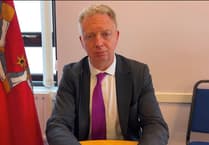A new strategy that paves to way to tackle a significant skills shortage and build a ‘future ready’ workforce for the island has been unveiled.
The ‘Skills Strategy’ provides a framework for both the government and employers to actively invest in upskilling people in current and emerging sectors over the next three years.
Tackling the skills shortage across multiple sectors is a key objective of both the Island Plan and the economic strategy that aims to create and fill 5,000 new jobs by 2032.
The skills strategy has been developed by the Isle of Man Skills Board, which sees government working with the Chamber of Commerce and educational providers to ensure that the island’s workforce meet the needs of the economy.
Chamber chief executive Rebecca George said: ‘Embracing a new skills strategy is not just a step forward; it's a testament to our commitment to growth, innovation and a strong partnership between business and government.’
Minister for Education, Sport and Culture, Daphne Caine MHK said: ‘Like many countries, the island faces a significant challenge to ensure it has a future-ready workforce, equipped with the right skills to drive economic growth and ensure essential services are maintained.
‘Solving the current skills shortage is a government priority and the high-level strategic priorities set out in the strategy will offer people greater access to high-quality learning and employment opportunities. With improved skills and qualifications, individuals will be able to increase their earning potential and improve their living standards.’
Peter Reid, independent chair of Skills Board, added: ‘This strategy paves the way for a skills landscape that is well-understood, agile, dynamic and employer-led.
‘In order to meet the current and future skill needs, access to relevant learning and skills development opportunities must be developed that align to the needs of industry.’
Tim Johnston MHK, Minister for Enterprise, said: ‘The creation of the Skills Board has provided an important platform to focus conversations, priorities, actions and outcomes in relation to driving the workforce, and through a collaborative approach, fully understand the needs of businesses both now and into the future.’
The strategy can be found on Tynwald’s Register of Business and will be debated at the May sitting next week.


-24.jpeg?width=209&height=140&crop=209:145,smart&quality=75)


Comments
This article has no comments yet. Be the first to leave a comment.